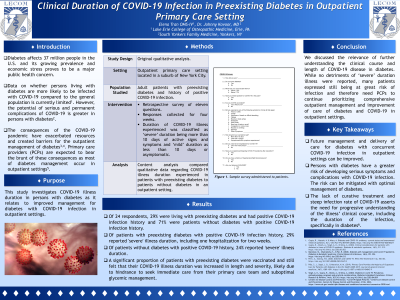Back


Diabetes in Practice
(P305) Clinical Duration of COVID-19 Infection in Pre-existing Diabetes in Outpatient Primary Care Setting
Friday, August 12, 2022
12:00 PM – 1:00 PM ET

Has Audio
.jpg)
Elena N. Tran, OMS-IV
Medical Student
Lake Erie College of Osteopathic Medicine
Bronx, New York, United States
Primary Presenter(s)
Key Takeaways of Your Research: Diabetes affects 37 million people in the U.S. and its growing prevalence and economic stress proves to be a major public health concern. The consequences of the COVID-19 pandemic have exacerbated resources and created barriers for the outpatient management of diabetes. Although there have been recent advancements in the management of COVID-19, such as the booster doses for the COVID-19 vaccine, primary care providers still face limited knowledge and management for people with diabetes who contract COVID-19. The need for primary care providers to continue prioritizing comprehensive outpatient management of diabetes and COVID-19 was the principal objective that guided this research.
Background/Purpose: Data on whether people with diabetes are more likely to be infected with COVID-19 compared to the general population is currently limited. However, the potential of serious and permanent complications of COVID-19 is far greater in people with diabetes. This creates a daunting challenge for primary care practitioners as majority of diabetes management and care occur in outpatient offices. Research Hypothesis and/or Research Questions and Specific
Aims: This study investigates COVID-19 illness duration in people with preexisting diabetes as it relates to improved management for those with COVID-19 in outpatient settings. Methods/Methodology: A retrospective survey of 11 questions was distributed, during a 4-week period, to adult patients in an outpatient primary care setting located in a New York City suburb. Survey data included most recent HbA1c level, COVID vaccine status, clinical symptoms experienced, presence of lingering symptoms after resolution, and hospitalization due to COVID-19, with focus on illness duration.
Results: Of 24 respondents, 29% had preexisting diabetes and positive COVID-19 history and 71% without diabetes with positive COVID-19 history. Of the people with preexisting diabetes with positive COVID-19 history, 29% reported 'severe' illness duration, including one hospitalization for two weeks. Of those without diabetes with positive COVID-19 history, 24% reported 'severe' illness duration. A significant proportion of people with preexisting diabetes were vaccinated and still felt that their COVID-19 illness duration was increased in length and severity, likely due to hindrance to seek immediate care from their primary care team and poor glycemic management. Conclusions (Impact on Diabetes Care and Education): The consequences of COVID-19 exacerbated resources and created barriers for outpatient management of diabetes, possibly leading to severe duration of illness in susceptible populations with diabetes compared to those without diabetes. While no detriments of severe duration illness were reported, many expressed still being at great risk of infection and therefore need primary care practitioners to continue prioritizing improvement of diabetes management and COVID-19. Source of Funding for this Research: Not applicable.
Background/Purpose: Data on whether people with diabetes are more likely to be infected with COVID-19 compared to the general population is currently limited. However, the potential of serious and permanent complications of COVID-19 is far greater in people with diabetes. This creates a daunting challenge for primary care practitioners as majority of diabetes management and care occur in outpatient offices. Research Hypothesis and/or Research Questions and Specific
Aims: This study investigates COVID-19 illness duration in people with preexisting diabetes as it relates to improved management for those with COVID-19 in outpatient settings. Methods/Methodology: A retrospective survey of 11 questions was distributed, during a 4-week period, to adult patients in an outpatient primary care setting located in a New York City suburb. Survey data included most recent HbA1c level, COVID vaccine status, clinical symptoms experienced, presence of lingering symptoms after resolution, and hospitalization due to COVID-19, with focus on illness duration.
Results: Of 24 respondents, 29% had preexisting diabetes and positive COVID-19 history and 71% without diabetes with positive COVID-19 history. Of the people with preexisting diabetes with positive COVID-19 history, 29% reported 'severe' illness duration, including one hospitalization for two weeks. Of those without diabetes with positive COVID-19 history, 24% reported 'severe' illness duration. A significant proportion of people with preexisting diabetes were vaccinated and still felt that their COVID-19 illness duration was increased in length and severity, likely due to hindrance to seek immediate care from their primary care team and poor glycemic management. Conclusions (Impact on Diabetes Care and Education): The consequences of COVID-19 exacerbated resources and created barriers for outpatient management of diabetes, possibly leading to severe duration of illness in susceptible populations with diabetes compared to those without diabetes. While no detriments of severe duration illness were reported, many expressed still being at great risk of infection and therefore need primary care practitioners to continue prioritizing improvement of diabetes management and COVID-19. Source of Funding for this Research: Not applicable.
